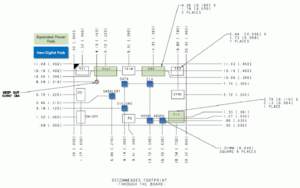DALLAS, TX--(Marketwire - October 6, 2010) - The Distributed-power Open Standards Alliance (DOSA), a global association dedicated to furthering compatibility and standardization in the DC-DC board mounted power conversion market, recently approved specification standards for the "Third Generation, High Density, Non-Isolated MICRO converter" for the MICRO (11.4mm x 20.3mm) format.
The third generation standard is based on the addition of new interconnects and enlarging existing power pads to enable higher density, new features and digital communication while maintaining the integrity of the second generation connections and dimensions. This allows the highest design flexibility with the opportunity to use previous generation products on the new footprint, or alternatively use new generation products with existing circuit board footprints. While the standard establishes the new connectivity for digital communication, it is not restricted to digital POLs. The standard applies to both analog and digital non-isolated POLs.
Following in the footsteps of the PICO standard, the MICRO standard is intended for solutions at higher current and power levels than the PICO. The MICRO standard is also designed to interlock with the PICO standard such that a single nested solution may be implemented by the board designer. This allows rapid migration between PICO and MICRO packages without necessitating a board re-layout. The flexibility of the DOSA-based nesting significantly reduces design risk and creates the opportunity for cost optimization throughout the development cycle.
The new standards include provisions for an I2C bus which may be implemented with Power Management Bus (PMBus™) protocol functionality. Digital power provides access to critical load information, including current and voltage, enabling the system to monitor the power consumption at the highest possible resolution -- at the processor or load. It also allows for control of the module enabling system optimization at a previously inaccessible level. The benefits of digital power are still being defined, but this standard allows for the rapid, low risk exploration of the benefits of this new capability. The standards also allow for improved thermal de-rating by increasing the thermal coupling between a module and a customer's board, enabling higher current densities without significant current de-rating at higher temperatures.
"It is encouraging to see DOSA standardize additional digital footprints for increased capacity in DC-DC point-of-load (POL) converters," said Linnea Brush, senior research analyst, Darnell Group. "DOSA standards-based digital power converters enable power design engineers worldwide to reduce risk and accelerate development schedules while leveraging multi-vendor sourcing efficiency."
DOSA was founded in 2004, by Lineage Power and SynQor, to develop standards for DC-DC converters to ensure compatibility and facilitate second sourcing for customers. DOSA carries the mission of establishing standards over a broad range of power converter form factors, footprints, feature sets and functionality for both non-isolated point-of-load (POL) and isolated applications.
About DOSA
The Distributed-power Open Standards Alliance (DOSA) was formed to further future DC-DC product compatibility and standardization within the fragmented power converter market. Alliance members include founding members Lineage Power and SynQor as well as AcBel, Bel Power, Delta Electronics, Emerson Network Power, Ericsson Power Modules, FDK, Murata Power Solutions, NetPower Technologies, Power-One, TDK-Lambda and Wall Industries. The goal of the alliance is to establish customer interface standards early in the development cycle, which include form factors, footprints, pin-outs, feature sets and other parameters that will facilitate alternative sourcing. The alliance covers a broad range of power converters including non-isolated (POL) and isolated applications. More information about DOSA is available at www.dosapower.com.
About PMBus
Aligned with DOSA, the PMBus is an open standard power-management protocol with a fully defined command language that facilitates communication with power converters and other devices in a power system. This standard allows for communication between devices based on both analog and digital technologies, and provides interoperability to reduce design complexity for power system designers. More information is available at www.pmbus.org.
Contact Information:
Michelle Barry
BridgeView Marketing
(603) 570-7533
